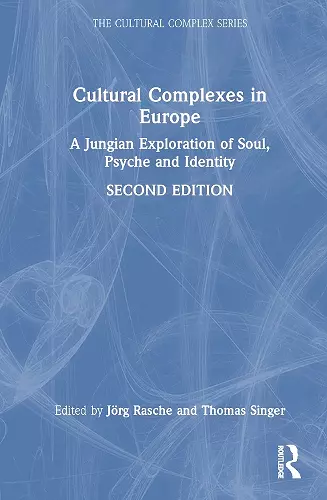Cultural Complexes in Europe
A Jungian Exploration of Soul, Psyche and Identity
Jörg Rasche editor Thomas Singer editor
Format:Hardback
Publisher:Taylor & Francis Ltd
Published:26th Mar '25
£140.00
Supplier delay - available to order, but may take longer than usual.
This hardback is available in another edition too:
- Paperback£34.99(9781041004226)

What is going on in Europe? The actual conflicts between its nations or states can be traced back to old and revived cultural complexes. In this book, first compiled in 2016, Jungian analysts explore the cultural identities of their European homelands and nations.
This is a new approach to old questions: What makes a people feel at home? How do their traditions and narratives form a cultural Self and identity? How do they differ from one another? Exploring cultural complexes blends knowledge of history, economics, sociology, anthropology, geography, psychology, religious studies, literature, and poetry. But as every complex is built around an emotional core, the study of how cultural complexes live in the psyche is not limited to these disciplines. Each author and reader engages in a confrontation with their emotions, prejudices, and projections. The shape that the ideas and feelings of a cultural complex take in the psyche can be inchoate, rapidly shifting and yet paradoxically long standing, and often quite immune and impermeable to the reason that traditional disciplines of thought would impose on them. These cultural complexes do not necessarily provide a coherent or linear sequencing of facts and events because that is not how they actually exist and function in the psyche of individuals and groups. At the same time, cultural complexes shape what it means to be a citizen of a particular city, region, or country of Europe.
This remarkable book is an important read for Jungian analysts and those interested in Europe’s historical and cultural development.
‘Qualities of passion and intellectual coherence co-exist in this extraordinary book, itself a product of history, politics, psychology and—often—personal experience and suffering. But what about the timing? Europe is in its deepest crisis since the Second World War and, in the absence of any credible solutions from conventional politics, depth psychology and the idea of cultural complexes are entitled to step into the breach. There is more: By assembling authors from so many different nations, Jörg Rasche and Tom Singer have created a special European union before our very eyes. They, and their stellar team of authors, have not only analysed the continental lines of conflict and war, but have also made noteworthy contributions to the achievement of peace-in-diversity.’
Professor Andrew Samuels, Author of A New Therapy for Politics?
‘This is a remarkable and original book and should be read by all those interested in Europe from historical, personal and cultural perspectives, including the roots of European conflicts and their implications for present-day issues. The authors are Jungian analysts or academics from different parts of Europe, and the book’s theoretical underpinning is the concept of cultural complexes, exploring their relevance, dynamics, positive and shadow aspects in individual countries. The editors, Jörg Rasche and Thomas Singer, and the publisher, Spring Journal Books, are to be congratulated for their vision in publishing at this time a book of high quality essays when contemporary Europe is in flux: struggling with its identity; with who belongs and who is excluded; with managing more flexible boundaries, especially challenging with the huge influx of refugees seeking sanctuary in European countries.
Jan Wiener, Director of Training, Society of Analytical Psychology, London; Former Co-Chair of the IAAP Education Committee with Responsibility for Eastern Europe
‘This book on Europe and its cultural complexes is both profound and perfectly timed. The individual articles are outstandingly written by authors who have a deep understanding of Jung and analytical psychology, and know how to connect that knowledge with the problems that Europe faces today. The viewpoints represented are essential to understanding the history of the different European countries and helpful in understanding why they are in such turmoil now. I highly recommend it.’
Thomas B. Kirsch, Former President of the International Association for Analytical Psychology
ISBN: 9781041004202
Dimensions: unknown
Weight: 720g
282 pages
2nd edition